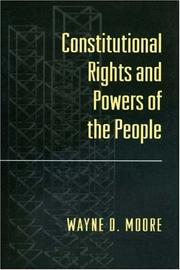| Listing 1 - 10 of 55 | << page >> |
Sort by
|
Book
Year: 2019 Publisher: ( ) : Anamosa,
Abstract | Keywords | Export | Availability | Bookmark
 Loading...
Loading...Choose an application
- Reference Manager
- EndNote
- RefWorks (Direct export to RefWorks)
Le mot « peuple » sert aujourd'hui à tout mais n'est plus nulle part. Nombreux sont ceux qui s'en réclament ou bien qui prétendent le défendre contre les populismes. Incisif et décapant, ce livre change la perspective ; il montre la nécessité de réinventer des mobilisations qui se passent à présent du mot et se méfient du mythe.« Si peuple est de l'ordre de l'action et non de la réaction, de l'agir et non de l'être, s'il ne rassemble ni ne crée aucune identité prédéterminée et stable, alors peut-être n'avons-nous pas besoin du mot pour commencer à nous retrouver. Il ne sera chez nous ni le mythe puissant déjà tout armé, ni le préalable à la construction d'une entité d'opposition. Alors, si le mot est faible, mais que notre action sur le réel est forte, nous le rechargerons. Peuple est devant nous, mais il a déjà commencé. »
Book
ISBN: 3050028203 Year: 1996 Publisher: Berlin Akademie Verlag
Abstract | Keywords | Export | Availability | Bookmark
 Loading...
Loading...Choose an application
- Reference Manager
- EndNote
- RefWorks (Direct export to RefWorks)
Book
ISBN: 0198745168 9780198745167 Year: 2016 Publisher: Oxford: Oxford university press,
Abstract | Keywords | Export | Availability | Bookmark
 Loading...
Loading...Choose an application
- Reference Manager
- EndNote
- RefWorks (Direct export to RefWorks)
Popular sovereignty - the doctrine that the public powers of state originate in a concessive grant of power from 'the people' - is perhaps the cardinal doctrine of modern constitutional theory, placing full constitutional authority in the people at large, rather than in the hands of judges, kings, or a political elite. Although its classic formulation is to be found in the major theoretical treatments of the modern state, such as in the treatises of Hobbes, Locke, and Rousseau, this book explores the intellectual origins of this doctrine and investigates its chief source in late medieval and early modern thought. Long regarded the principal source for modern legal reasoning, Roman law had a profound impact on the major architects of popular sovereignty such as François Hotman, Jean Bodin, and Hugo Grotius. Adopting the juridical language of obligations, property, and personality as well as the model of the Roman constitution, these jurists crafted a uniform theory that located the right of sovereignty in the people at large as the legal owners of state authority. In recovering the origins of popular sovereignty, the book demonstrates the importance of the Roman law as a chief source of modern constitutional thought.
Book
Abstract | Keywords | Export | Availability | Bookmark
 Loading...
Loading...Choose an application
- Reference Manager
- EndNote
- RefWorks (Direct export to RefWorks)
Book
ISBN: 9791037014337 Year: 2012 Publisher: Hermann
Abstract | Keywords | Export | Availability | Bookmark
 Loading...
Loading...Choose an application
- Reference Manager
- EndNote
- RefWorks (Direct export to RefWorks)
On appellera demophobie toute methode de contournement ou de rejet de la parole du peuple qui procede de l'allergie, de l'apprehension ou de la defiance que ce meme peuple suscite, qu'on l'estime ignorant , victime de ses affects suraffecte ou desaffecte. Elle est le propre des gouvernements, chaque fois que confrontes a une contestation ou des revendications populaires qui les derangent, ils commencent par minimiser cette parole ou la discrediter. Mais elle constitue aussi le point commun aveugle des theoriciens qui fustigent les derives de la democratie et se mefient des elections et de leur resultat, quand ils ne lui refusent pas toute legitimite. En interrogeant les presupposes de ces pratiques et de ces theories demophobes , le present essai entreprend de redonner son sens au suffrage populaire et d'en retablir les enjeux.
Book
Year: 2011 Publisher: [Place of publication not identified] : Perlego,
Abstract | Keywords | Export | Availability | Bookmark
 Loading...
Loading...Choose an application
- Reference Manager
- EndNote
- RefWorks (Direct export to RefWorks)
Book
Year: 2011 Publisher: [Place of publication not identified] : Perlego,
Abstract | Keywords | Export | Availability | Bookmark
 Loading...
Loading...Choose an application
- Reference Manager
- EndNote
- RefWorks (Direct export to RefWorks)
Book
ISBN: 3700303475 Year: 1982 Publisher: Wien Braumüller
Abstract | Keywords | Export | Availability | Bookmark
 Loading...
Loading...Choose an application
- Reference Manager
- EndNote
- RefWorks (Direct export to RefWorks)
Constitutional law --- People (Constitutional law) --- Territory, National
Book
Year: 1755 Publisher: A La Haye : chez Pierre Gosse Junior,
Abstract | Keywords | Export | Availability | Bookmark
 Loading...
Loading...Choose an application
- Reference Manager
- EndNote
- RefWorks (Direct export to RefWorks)
Nation-state --- People (Constitutional law) --- Political science

ISBN: 0691011117 Year: 1996 Publisher: Princeton (N.J.) : Princeton university press,
Abstract | Keywords | Export | Availability | Bookmark
 Loading...
Loading...Choose an application
- Reference Manager
- EndNote
- RefWorks (Direct export to RefWorks)
Constitutional history --- Constitutional law --- People (Constitutional law) --- Political rights
| Listing 1 - 10 of 55 | << page >> |
Sort by
|

 Search
Search Feedback
Feedback About UniCat
About UniCat  Help
Help News
News